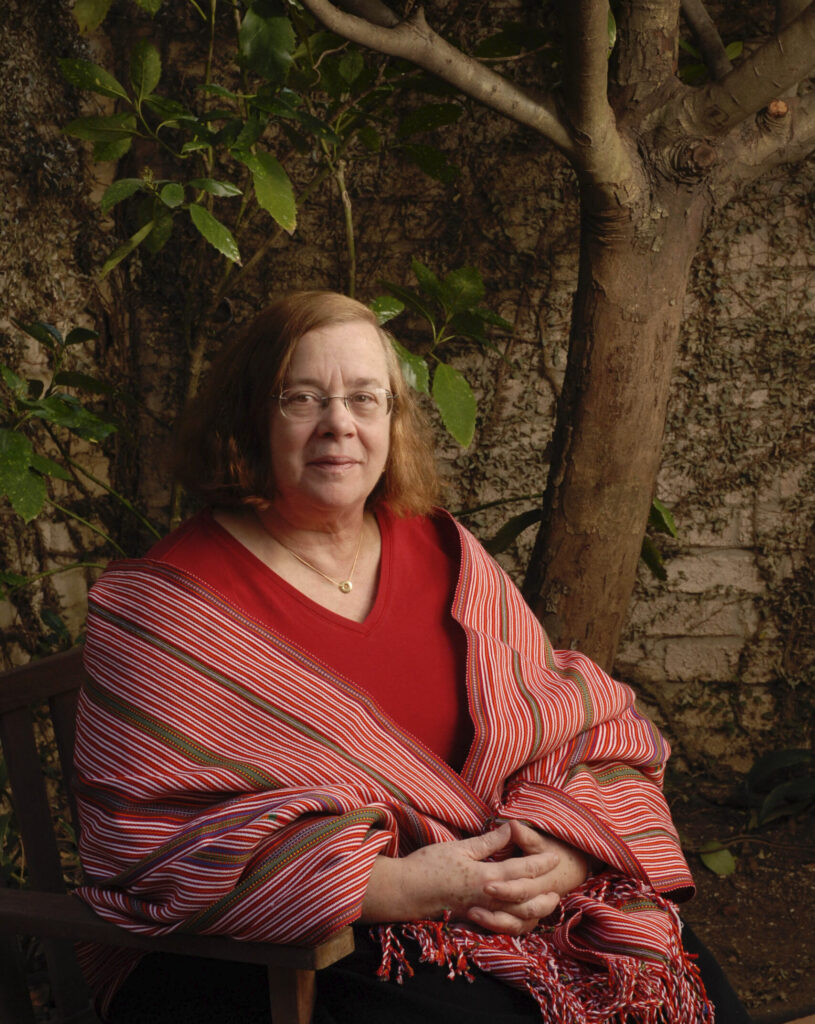
By SUSANNA SHARPE
NORA ENGLAND’S PASSION FOR LINGUISTICS was sparked in college, where, almost on a whim, she enrolled in a field methods course. “That really got me going—actually hearing data from another language and paying attention to it,” she recalled in an interview, describing one lecture as “jaw-dropping.” That linguistics class at Bryn Mawr, taught by Nancy Dorian, was “the first course that I ever took where I was willing to stay up late and study instead of fool around.”
England, who died on January 26, 2022, at the age of seventy-five, would go on to make an international name for herself in the field of documentary and descriptive linguistics. Among her key publications are her 1983 Grammar of Mam, A Mayan Language and the 2017 handbook The Mayan Languages, co-edited with Judith Aissen and Roberto Zavala Maldonado. Yet she is most celebrated for her decades-long work in Guatemala, during which she recruited Indigenous Maya, trained them as linguists, and worked with them to build a model of linguistics in which Indigenous scholars documented languages with and for other Indigenous peoples.
England was diagnosed with terminal cancer in August 2021. She was able to continue working throughout her treatment. The use of Zoom and virtual teaching during the pandemic allowed for the fall 2021 graduate seminar in documentary and descriptive linguistics to become an oral history lab with England as the subject. These recordings of England are the source for quotations from her in this article.
In 1990, while on the faculty at the University of Iowa, England co-founded OKMA (Oxlajuuj Keej Maya’ Ajtz’iib’), an Indigenous academy in Antigua, Guatemala, devoted to research and teaching on Mayan languages and linguistics. Through OKMA, England trained Indigenous speakers of Mayan languages in linguistics, including the documentation of their own languages through the creation of dictionaries, grammars, and texts transcribed from everyday speech.
In 1993, the MacArthur Foundation awarded her one of its coveted “genius” fellowships, citing her training of over 100 Indigenous Mayan linguists. But England’s Indigenous students didn’t all stay in Guatemala; some would eventually become graduate students in the United States, which brings us to Texas.
England joined the faculty of The University of Texas at Austin in 2001; in 2007 she was named the Dallas TACA Centennial Professor in the Humanities. At UT, she established and led the Center for Indigenous Languages of Latin America (CILLA) in partnership with the Teresa Lozano Long Institute of Latin American Studies (LLILAS). A revered and beloved professor in the Department of Linguistics, England was the department’s longtime graduate adviser at the time of her death.
Early Days in Guatemala
According to England, she almost didn’t go to Guatemala. While completing her master’s degree at the University of Florida in 1971, she saw a call for linguists to work on a language-documentation project in Guatemala. England recalled, “I looked at the announcement and it looked awfully interesting, but then I said, ‘Well, I can’t do that. I don’t speak Spanish . . . I don’t know anything about Guatemala.’ It scared the pants off me . . . so I threw it away.”
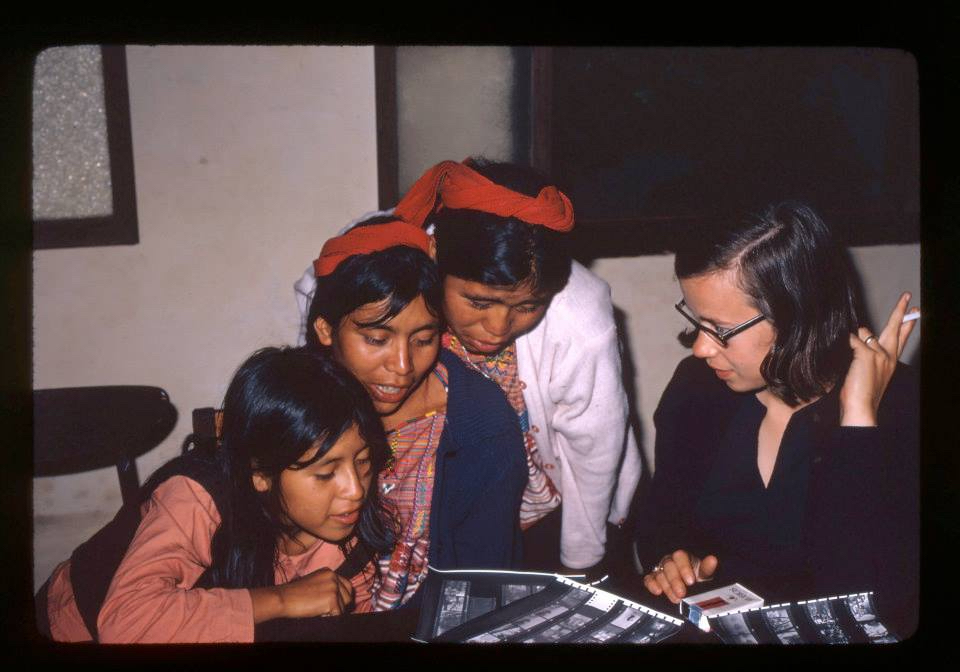
But the Guatemala project intrigued her. As envisioned by Terrence Kaufman, “the crazy gringo in charge,” to quote England, the Proyecto Lingüístico Francisco Marroquín (PLFM) would establish a research center where Indigenous language speakers would work on their own languages. The project was subsidized by the Peace Corps, and included intensive training in Spanish and a modest stipend. When the call arrived a second time, England answered it.
Indigenous Maya make up close to half of the population of Guatemala, and live also in other parts of Central America and southeastern Mexico. But until the 1970s, most Maya had very limited access to education. During her time with PFLM, England was part of a cohort of young linguists who worked on some of the thirty different Mayan languages. She cites the PFLM as a major force in the expansion of the study of Mayan grammar in the 1970s and the increasing inclusion of native speakers in that process.
England would continue to cross paths with Kaufman throughout her career. In a recent phone conversation, Kaufman described her as “a giant figure in descriptive linguistics.” Kaufman himself died on March 3, 2022. A portion of his extensive papers and field materials are part of the Archive of the Indigenous Languages of Latin America (AILLA) at UT Austin.
Oral History
Through seven sessions recorded with students and colleagues in fall 2021, England recounts her trajectory as a student, linguist, teacher, and researcher, and discusses her vision and her philosophy, not only for linguistics, but for teaching, for mentoring, for living. Her intellectual clarity is on full display in these sessions, as is her well-known penchant for blunt truth-telling. But what really jumps out is her conviction that speakers of Indigenous languages must be leaders in how their languages are studied, taught, preserved, and revitalized.
“Speakers of Indigenous languages, to my mind, will never have control of their languages if they leave some aspect of those languages always to foreigners,” England said in one of the sessions. “The most important thing that those of us who are ‘true outsiders’ . . . have to work on, is making sure people in the community become the leaders of this whole enterprise of strengthening the languages through the use of linguistics, linguistic knowledge, and materials that you can produce once you have those.”
“Nora was a pioneer in developing initiatives toward training speakers of Indigenous languages in linguistics, which required a fabulous mix of fearlessness, personal warmth, and an ability to listen and attend to other people’s needs even when these were not very overtly expressed,” said Pattie Epps, her UT Linguistics colleague. “One sometimes got the sense that she was trying to hide a very soft heart under a gruff exterior, without much success in that her warmth always showed through.”
[spacer height=”20px”]Born Nora Clearman in Washington, DC, in 1946, she was raised in Hicksville, NY, a blue-collar community on Long Island, the daughter of a physicist father and a mathematician mother. Her brother, Stephen Clearman, describes his older sister as “unrelentingly selfless and generous.”
“She had a broad sense of duty and obligation, and she found an outlet for that in her career,” said Clearman.
England’s own words echo that notion: “When people want to know something and you know it, then you have a responsibility to teach it to them.” She was dogged in her belief that Indigenous Maya were experts in their own languages, and that those with an interest in linguistics, and an aptitude for it, could be trained to be linguists to work in the preservation and revitalization of their languages.
After graduating from Bryn Mawr College with a degree in anthropology, England earned graduate degrees at the University of Florida in linguistic anthropology. Her work with PLFM in Guatemala during the early 1970s gave focus to her later doctoral work and her specialization in Mam, a Mayan language spoken by over half a million people.
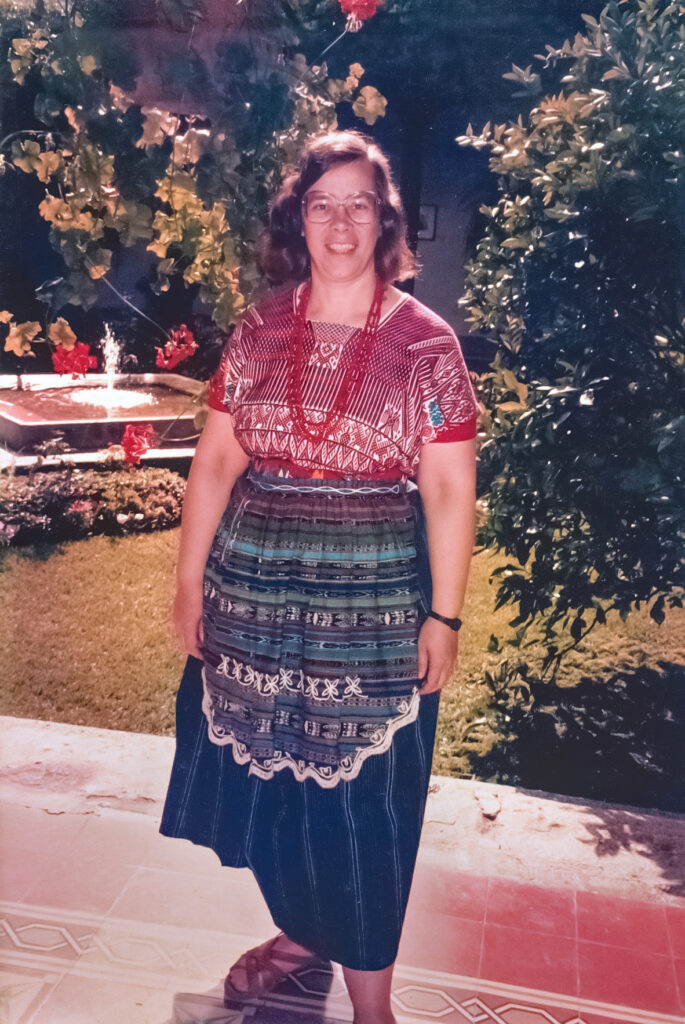
England’s love for her field, and her deep belief that Indigenous speakers must be part of the forefront in linguistics, has led to a strong and growing presence of Latin American Indigenous students pursuing graduate degrees in linguistics at UT. To date, eight Indigenous students have earned a PhD in linguistics and one in anthropological linguistics.
“Nora was the heart and soul of our program in documentary and descriptive linguistics,” department chair Richard Meier said. “Her life, her person, her scholarship, were all wrapped up with her students, her colleagues, with supporting the Maya in Guatemala, with promoting the training of Indigenous speakers of Latin American languages to become linguists and receive doctorates.”
As longtime graduate adviser in the Department of Linguistics, England was known as a firm but supportive mentor to students. “Fue una mamá académica [she was an academic mother],” wrote Jaime Pérez González, an Indigenous speaker of Tseltal from Chiapas, Mexico, who earned his PhD in 2021. “She put her faith in a diversity of voices in linguistics from Latin America, and was able to make this blossom at UT Austin, promoting us and making us feel included. I am a fruit of that effort.”
England played a role of “transformational importance,” turning certain accepted norms on their head, according to her close colleague Anthony Woodbury. “Whereas it is typical for distinguished new faculty to start big funded research projects and let doctoral students—mostly from the global north—join in as a part of their training and then ‘parachute’ into Indigenous communities to do research, Nora took an opposite approach,” wrote Woodbury. Her plan was “to recruit native speakers of Latin American Indigenous languages as doctoral students, make sure that they received adequate training in English, shepherd them through our regular Linguistics program, and let their work guide the direction of Latin American language research, all with a strong community basis.” The success of this plan was unprecedented.
England’s vision changed the field of linguistics, but her deep sense of generosity should receive equal billing. Martin Kohlberger, now a professor at the University of Saskatchewan, recounts how England and her colleague Pattie Epps intervened when they saw him struggling to finish his dissertation at the University of Leiden. “They invited me to Austin and let me stay in their homes for many months at a time, without asking for any rent money or anything else. They gave me the necessary space and safety network that I needed to get back on track with my dissertation and finish it. I will always fondly remember the many months that I lived with Nora. I’ll cherish the memories of lounging in her living room in evenings, with Nora cracking jokes in her usual blunt and sharp tone.”
“Nora’s living room” deserves a place of honor in her story. “Her house was this hub of connection,” said colleague Danny Law. “She would host monthly gatherings for people who worked in Latin America.” The presence of visiting linguists was also an occasion for such parties. “It’s one of the things that people really remember about her—how she would bring people together at her house, bring people into her life.”
Beyond the Linguistics Department
Nora England’s activities and initiatives on the Texas campus are further testament to her broad and inclusive vision and her commitment to what longtime friend and colleague Charles Hale (director of LLILAS Benson, 2009–2016) called “her lifelong project of forging a current of Indigenous-centered linguistic practice.”
Upon joining the UT faculty, England established the Center for Indigenous Languages of Latin America (CILLA), whose activities include a large biennial conference held at UT Austin that brings dozens of linguists to campus to present their research. Talks are primarily given in Spanish, making the conference accessible to Latin American scholars.
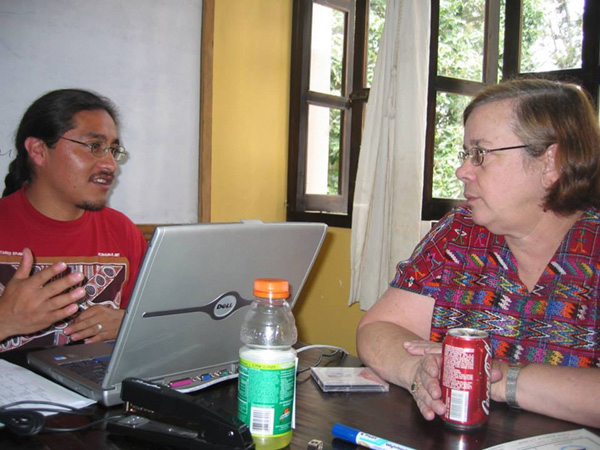
She was also an affiliate and former advisory board member of the Native American and Indigenous Studies (NAIS) program at UT, directed by Luis Cárcamo-Huechante, an Indigenous Mapuche and professor in the Department of Spanish and Portuguese. Cárcamo-Huechante acknowledged his colleague for “actively collaborating in the search for and recruitment of new Indigenous members of our faculty at UT Austin.” Recalling his early visits to campus in 2009, he added that England’s support for his recruitment “was a major honor and reason for me to come here.”
England’s support is also remarked on by Kelly McDonough (Anishinaabe-Irish descent), professor in Spanish and Portuguese and a scholar of Indigenous Nahua intellectuals. “Nora provided me with crucial mentorship. She gave no-nonsense advice and provided a stellar example of female success in male-dominated fields.” McDonough says she applies two “classic Nora points of wisdom” in her daily life: “First, she never suffered fools, and second, she only paid attention to what was important: the ideas and the people they affected.”
“Nora was a towering figure for every Guatemalan with a passion for Mayan languages and for linguistic justice,” wrote Sergio Romero, associate director of the LLILAS Indigenous Languages Initiative. “She was one of the most enthusiastic supporters of the Indigenous Languages Initiative, a sincere believer in the power of linguistic scholarship for substantive social change.”
Social change might inevitably be a result of Indigenous linguistics being in the hands of Indigenous linguists. However, Hale makes an important point about Nora England’s work and beliefs: she “objected vigorously” to being called an activist.
“Nora perceived no contradiction whatsoever between the basic tenets of linguistic science and her fervent commitment to Indigenous empowerment through training and promotion of Indigenous intellectuals. Nora’s ability to locate her life work in this space of convergence became her superpower; it made her a Rockstar in the profession—respected, often revered, even by those who did not show any particular enthusiasm for the changes she sought and embodied.”
Legacy
At some point during her years of research and collaboration in Guatemala, England was given a Maya name, Ixkeem. OKMA co-founder Pakal B’alam Rodríguez Guaján writes that in addition to accepting this name, “she also showed solidarity with the Maya sisters in the use of uq (Mayan skirt), po’t (Mayan blouse), and pas (Mayan belt).” According to England’s longtime friend and 2017 co-editor Judith Aissen, Ixkeem means tejedora, or “woman weaver,” including “woman weaver of words.” It is significant that the weaver of words would be drawn to showing her solidarity through a nonverbal act—the wearing of woven garments. In Guatemala, this is also a political act.
The powerful example and impact of Nora England’s actions and her words will be her legacy as her students, colleagues, friends, and family find ways to honor her life and continue her work. This is true for longtime collaborators and brand-new ones, like LLILAS Director Adela Pineda Franco, who arrived on campus in August 2022 and was only able to meet England via Zoom.
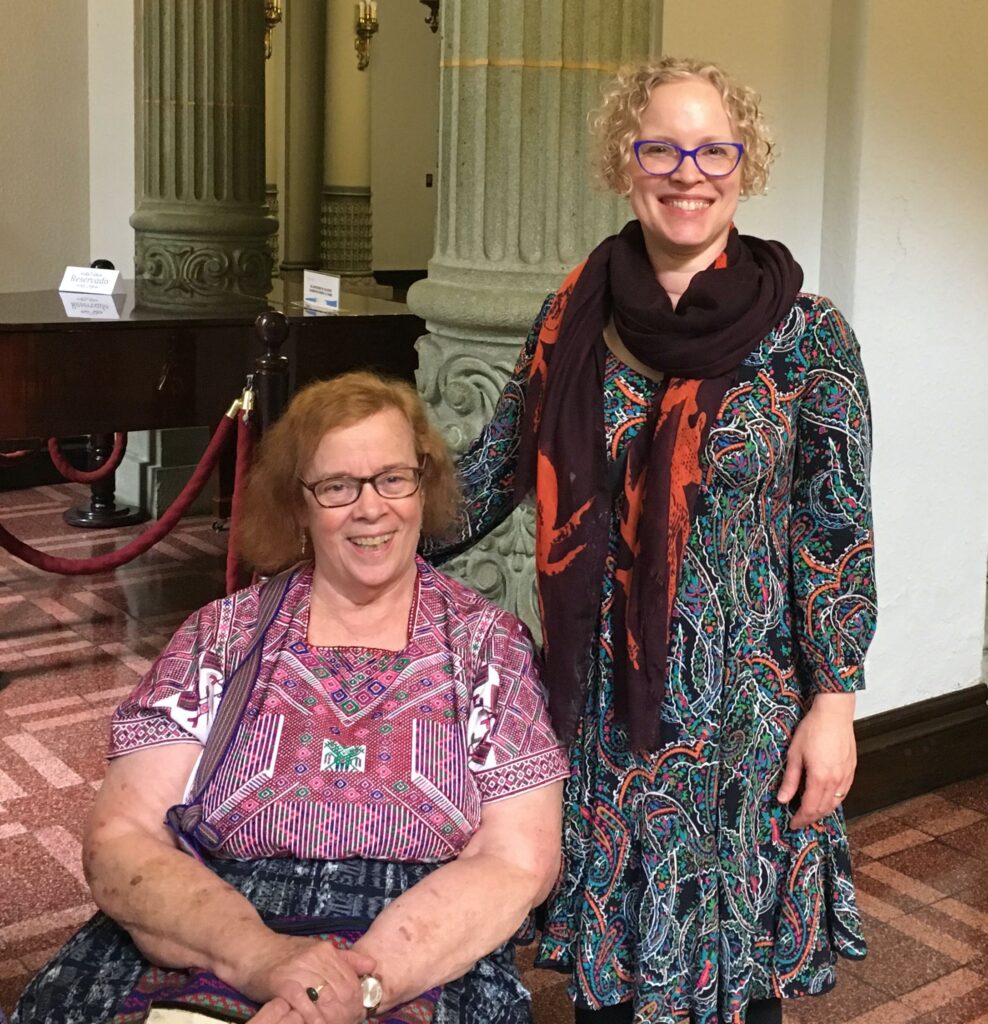
“I truly regret not to have had the chance to meet Nora England in person, shake her hand, and thank her deeply for her contributions to Indigenous language and cultural studies at LLILAS Benson. Her work led many linguists to become collaborators in language revitalization in several regions of the world. Yet, her most important legacy lies in her relentless effort to understand cultural affirmation and activism through the struggle for social rights and language. Her work at LLILAS Benson will remain alive for generations to come.”
“There has been a major shift in the role native Mayan speakers play in Mayan linguistics,” said Judith Aissen. “In the 1970s, they worked as ‘consultants,’ assisting outside linguists in their research projects. But there is now a significant cadre of native-speaker linguists with advanced degrees in linguistics who have taken up research, teaching, and public policy positions in Guatemala, Mexico, the U.S., and Canada. And really, the central person responsible for this shift is Nora.”
Messenger of Peace
On May 31, 2019, Nora England was honored by the Guatemalan Ministry of Culture and Sports at the Patio de la Paz (Peace Patio) in Guatemala’s Palacio Nacional de la Cultura. During a ceremony acknowledging her forty-eight years of work on the preservation of Maya languages and training Maya linguists, England performed the Cambio de la Rosa de la Paz—the Changing of the Peace Rose—a ritual gesture of peace evoking the end of Guatemala’s armed conflict in 1996. Indigenous Guatemalans had paid a heavy price during the thirty-six-year war. Following the ceremony, England received a document naming her Mensajera de la Paz—Messenger of Peace. It was the last time she would visit Guatemala.
Aissen said that England knew she was nearing the end of her life. By all accounts, it was a life lived intensely, and well. England was student and teacher, listener and leader. She could be gruff and direct. She was also enormously generous and kind. Perhaps she believed that to render one’s unvarnished opinion is a form of kindness. She treasured languages and their speakers, and saw no hierarchy among them. Her work lives on in those who continue documenting and preserving Indigenous languages, and in those who value and uplift this work. That was her message; that is her legacy. ✹
Susanna Sharpe, a writer, editor, and musician, is Communications Coordinator for LLILAS Benson Latin American Studies and Collections.
